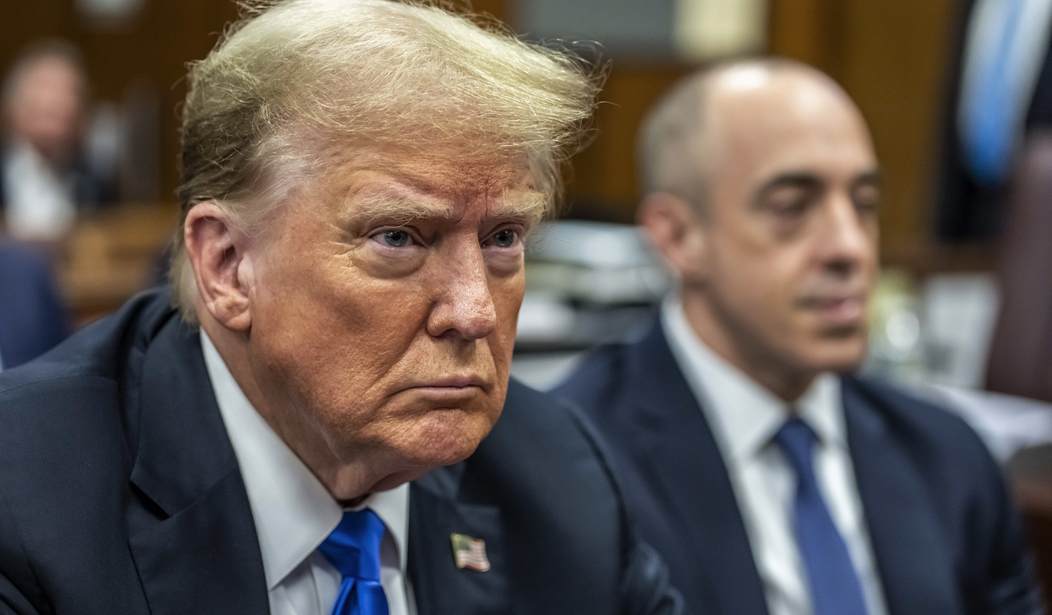After six weeks of trial in Manhattan, the jury has returned its verdict against former President Donald Trump for falsifying business records regarding payments made to reimburse Trump's former attorney, Michael Cohen, for money Cohen paid to Stormy Daniels in October 2016 in exchange for a non-disclosure agreement. Following roughly 11 hours of deliberation (and after initially signaling they were going home for the day on Thursday), the jury of seven men and five women found the former president guilty on all 34 charges.
Manhattan DA Alvin Bragg first filed the charges in March of 2023, a move that drew sharp criticism given that both his predecessor and federal authorities had declined to pursue the matter. Additionally, in order to get around the statute of limitations on what would typically be misdemeanor charges, Bragg attempted to elevate the charges to felonies by asserting that the purported falsifications were done in furtherance of or to conceal another crime. What that other crime was remained nebulous both before and during the trial, but it eventually was revealed to be a violation of New York state election law.
READ MORE:
DA Finally Reveals Underlying Crime Trump Allegedly Committed, and the Bidens Should be Nervous
Ahead of the trial, Judge Juan Merchan made several rulings in favor of the prosecution regarding witnesses who would be allowed to testify and evidence that would be allowed in. Further, the Trump legal team's requests to postpone the trial were denied.
READ MORE:
Rough Day in Court for Trump Legal Team As Judge in Hush Money Case Rules on Pre-Trial Motions
Judge Denies Motion to Delay 'Hush Money' Trial, Blames Pre-Trial Publicity 'In Part' on Trump
Then, too, there was the issue of the gag order imposed on Trump by Merchan — resulting in $10,000 worth of fines and the threat of incarceration levied against the former president — and the initial indication the judge may not agree to recess court in mid-May to allow Trump the opportunity to attend his son Barron's high school graduation (though the judge ultimately relented on that front).
READ MORE:
Trump: Judge Won't Let Me Go to Barron's High School Graduation
Donald Trump Faces Possible Jail Time for Gag Order Violation in Manhattan Case
Jury selection took the better part of the first four days. Sadly, the fourth day of trial also included a man self-immolating outside the courthouse. Twenty-two witnesses were called — 20 by the prosecution, two by the defense — including several records custodians whose purpose was to lay the evidentiary foundation for records related to the payments in question and various phone calls and texts between some of the key players.
The most notable of the witnesses were David Pecker (former publisher of the National Enquirer), Keith Davidson (former attorney for Stormy Daniels), Hope Hicks (former Trump aide), Madeline Westerhout (former executive assistant to Trump), Stormy Daniels, Michael Cohen (Trump's former attorney), and Robert Costello (Cohen's former attorney).
When the instructions were read to the jury on Wednesday morning, that invited further scrutiny as Judge Merchan told the jury that while they would need to be unanimous on the falsification of records charge (and the New York election law predicate), they did not need to be unanimous as to what "unlawful means" were employed to violate that election law — could be a violation of the Federal Election Campaign Act, could be the falsification of other business records, could be a violation of tax laws....choose your poison.
READ MORE:
Here Are the Jury Instructions in Trump's Manhattan Trial
After four-and-a-half hours of deliberation on Wednesday, the jury requested that certain portions of the testimony of David Pecker and Michael Cohen, as well as a re-reading of a portion of the instructions. (In New York, the jury doesn't get a printed out version of the instructions with them in the deliberation room.)
Throughout the trial, RedState provided daily summaries as well as articles pertaining to the various highlights and lowlights, all of which can be found here.
What's Next?
Now that the verdict is in, Trump's legal team will likely move to set aside the verdict and then appeal the verdict, assuming that motion is not granted. There appear to be ample grounds on which to base an appeal, though there is no guarantee that the appellate courts in New York will reverse the verdict and order a new trial. It's possible, though — see, e.g., Breaking: Harvey Weinstein 2020 Rape Conviction Overturned by NY Appeals Court. Bear in mind that the appellate process can be quite lengthy (note that Weinstein's verdict was overturned over four years after his conviction), so will by no means be resolved prior to the election in November.
This is a developing story. RedState will bring you further coverage and insight on the trial outcome as it becomes available.
READ MORE:
What We Know: The Jury Is Now Seated for Trump's Manhattan 'Hush Money' Trial
Man Who Set Himself on Fire Outside of Trump Trial Is Dead—Don't Self-Immolate













Join the conversation as a VIP Member